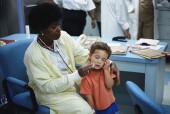
TUESDAY, Feb. 28 (HealthDay News) — Many parents who bring their children to the emergency room with fevers are making the right decision, Dutch investigators report.
“Self-referred febrile [feverish] children should not be generalized, and therefore not approached, as a uniform group of non-severely ill patients,” said lead researcher Dr. Yvette van Ierland, from the department of pediatrics at Sophia Children’s Hospital/Erasmus University Medical Center in Rotterdam.
“Measures to discourage parents from self-referral are undesirable,” she added. “This may potentially result in delayed or missed diagnoses.”
In general, illnesses that are associated with a fever for which early diagnosis is important are serious bacterial infections, such as meningitis, bacteremia, urinary tract infections or pneumonia, Ierland said.
The researchers found that one in four parents properly judged and acted on their child’s illness by going to the emergency room, Ierland said.
The report is published in the March issue of Pediatrics.
To see if parents’ judgments were on target, Ierland’s team compared children with fevers referred to emergency rooms by doctors to children who were brought in by their parents.
Of more than 4,600 children under the age of 16 with fever included in the study, 38 percent were referred by general practitioners and 62 percent by parents.
Among the children referred by doctors, 46 percent were classified as needing urgent care, compared with 45 percent of the children taken in by a parent, the researchers found.
In addition, 43 percent of children referred by doctors needed extensive treatment such as intravenous medications, asthma treatment or were hospitalized, compared with 27 percent of the children parents brought in for care, they noted.
Children who needed urgent care, such as those with difficulty breathing, stomach problems, neurological problems or fever with no known reason, were referred equally by doctors and parents, they added.
However, Dr. Roya Samuels, a pediatrician at Cohen Children’s Medical Center in New Hyde Park, N.Y., doesn’t think the situation necessarily applies to the United States.
“I would take the results of this study with a grain of salt,” she said. Perhaps parents in the Netherlands are better educated about the signs of serious illness in their children in the United States, she noted.
“Here a lot of parents bring in their children for a simple cold with fever that could very easily be handled over the phone by a medical professional,” Samuels said.
If parents would call their doctor before deciding to take their child to the hospital “we could save parents a lot of trouble and time going to the emergency room for unnecessary visits,” she added.
However, doctors should not discount parent’s assessment of their child, Samuels stressed.
Some parents might overreact to a simple illness with fever, she said. “But parents have a sixth sense when it comes to their own children, and physicians need to take that seriously,” she added.
Fever is the way the body fights off a viral illness, and most of the time the child does not need to go to an emergency room, Samuels said. “No intervention is needed unless there are other telltale signs that this could be a bacterial infection. We look for other more worrisome signs that accompany the fever.”
Signs that an illness might be serious include whether the child with a fever is not as active as usual or not eating or drinking. “That’s concerning to us,” Samuels said.
“If there is any trouble breathing, if there is any dehydration, those would be immediate red flags for me,” she said. “Duration of fever is another important factor. If a child has had fever over three to five days that child should be seen.”
More information
For more on fever in children, visit the U.S. National Library of Medicine.

